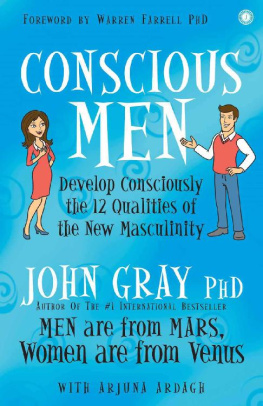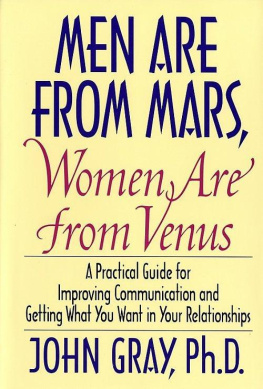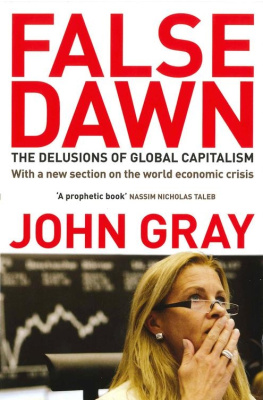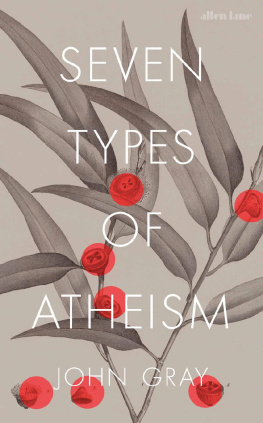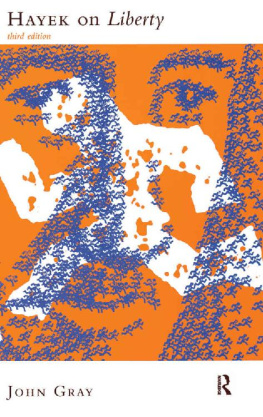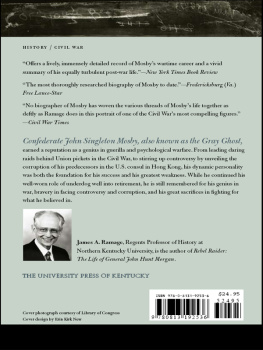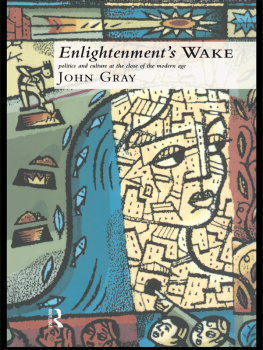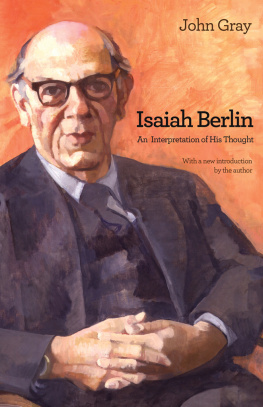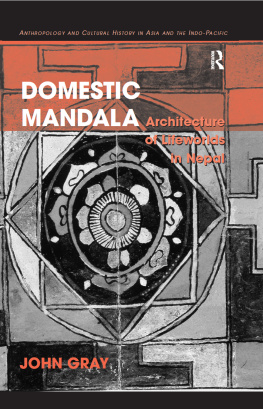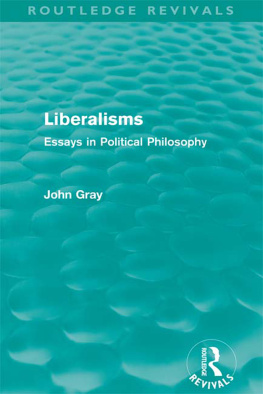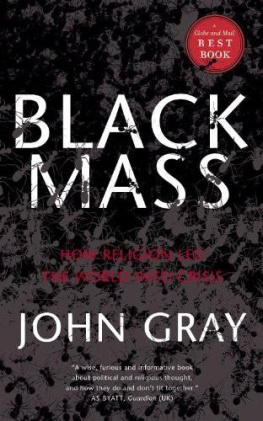CONSCIOUS MEN
Develop Consciously the 12 Qualities of the New Masculinity
JOHN GRAY P H D
WITH ARJUNA ARDAGH
F OREWORD BY W ARREN F ARRELL P H D
JAICO PUBLISHING HOUSE
AhmedabadBangaloreBhopalBhubaneswarChennai DelhiHyderabadKolkataLucknowMumbai
Published by Jaico Publishing House
A-2 Jash Chambers, 7-A Sir Phirozshah Mehta Road
Fort, Mumbai - 400 001
www.jaicobooks.com
John Gray and Arjuna Ardagh
Published in arrangement with
Self X Press
An Imprint of Awakening Coaching LLC
420 Nursery St, Nevada City CA 95959
To be sold only in India, Bangladesh,
Bhutan, Pakistan, Nepal, Sri Lanka and the Maldives.
CONSCIOUS MEN
ISBN 978-81-8495-922-2
First Jaico Impression: 2016
No part of this book may be reproduced or utilized in any form or by any means, electronic or mechanical including photocopying, recording or by any information storage and retrieval system, without permission in writing from the publishers.
Dedication:
For the Boys and the Young Men
Coming of Age Today
You are Our Future
Our Hope
and Our Evolutionary Potential
CONTENTS
Introduction
1.He Knows His Mission and Purpose
2.He Takes Space Gracefully
3.He Knows How to Love Deeply
4.He Listens Like the Sky
5.He Feels His Wounds But is Not Run by Them
6.He Transforms His Anger into Powerful Leadership
7.He Stands by His Brother
8.He Keeps His Word
9.His Humor Opens Hearts
10.His Sex Is a Gift of Love
11.He Respects the Gifts of the Feminine
12.He Is Aware of Our History
Epilogue
FOREWORD
by Warren Farrell, Ph.D.
Conscious Men is precisely what men need at this point in history. Until now, societies survived based on their ability to have their sons be unconscious of their own needs. To survive, we needed boys and men who did not question dying for their country, tribe, or kinship network. We needed them to buy into the belief that it would make them a hero, give them glory, and make them loved and respected (even if that meant loved, respected, and dead). To question this would make a man a disappointment to his parents, disrespected by peers, and ineligible for a womans love.
Now, though, we are experiencing The Irony of Industrialization. That is, when a society successfully trains its men to focus unconsciously on the ingredients of survivalearning money and becoming a killer-protectorit acquires the luxury of becoming conscious. Ironically, training to be unconscious has created freedom to be conscious.
From The Irony of Industrialization emanates the void filled by John Gray and Arjuna Ardaghs Conscious Men. Thousands of books have provided men with the guidelines to climbing the ladder of success-as-survival. The need for Conscious Men derives from the fact that the handbook for success-as-survival is almost the opposite of the handbook for success as a conscious man.
For example, success as an attorney means learning to argue; being a conscious husband or dad means listening like the sky. Being a great warrior means developing a killer reflex; being a conscious leader and dad means also developing an empathetic reflex.
Success-as-survival consciousness focused on how to get higher up the ladder faster but not a consciousness as to which wall we wanted to lean the ladder against. It was focused more on profit, and less on pollution, because honor was awarded to the successful CEO more than the environmentally-conscious CEO.
Once a man had children, few dads felt they could afford to be conscious of whether they wanted to be a full-time dad, artist, actor, writer, or contemplator of the path to consciousness. Being a starving artist was acceptable for the young single man, or the gay man, but not for what a real man became: a dad with children. Until I authored my third reasonably successful book, my own dad couldnt accept that I could be both responsible and an author.
Many of the qualities it took to create a killer-protector consciousness are described by words similar to those in Conscious Men. They are words like purpose, mission, loyalty, integrity, and honor.
However, in survival-focused consciousness, purpose and mission were externally defined by parents, religion, the fear of ostracism, and ineligibility for love and respect. In Conscious Men, purpose and mission are more internally defined.
Conscious Men guides a man to look within and discover his purpose and mission; to be in touch with his feelings but not ruled by his feelings; to live a life that is in pursuit of his path while honoring the commitments he made during that pursuit.
In the past half-century, the womens movement expanded womens sense of purpose. Now women have options: raise children, raise money, or do some combination of both. This encourages women to be consciousto look inside of themselves to discover which combination of options suits their personality.
Conscious Men can fill mens purpose void. It can be the parent, the school, and the mentor for mens roadmap to their discovery of their unique calling.
Conscious Men can also guide the boy or man we love to apply his expanded consciousness to the real world. He will learn new ways of being loyal, new senses of purpose, new forms of humor, new ways of respecting women, and ways to love and be loved not just as a human doing but also as a human being.
Warren Farrell, Ph.D.
Author, The Myth of Male Power
Mill Valley, CA. September 11, 2015
INTRODUCTION
Men today all over the world face challenges that no man has faced before in thousands of years.
We only have to go back a couple of generations to find that a mans life was fairly simply defined. He would commonly be educated in an all boys school. He went through different kinds of rites of passage into manhood, depending on his culture. Then a man would spend his day facing difficult and sometimes dangerous challenges. To the degree that he could be triumphant in those challenges and experience victory, he would feel good about himself and feel he had earned the right to rest and rejuvenation. He would come home to his woman, who most probably spent her day nursing or looking after children, maintaining the home, and preparing and cooking food.
Both genders knew their well-defined roles, but eventually felt restrained and constricted by them. It is hard to believe that you only have to go back about a hundred years to a time when most people agreed that women did not have the intelligence to make political choices. They were thought of as the fairer sex... the weaker sex... who should not bother their pretty heads with the affairs of the world. It was Emmeline Pankhurst, in London, who campaigned for womens right to vote, and the suffragette movement then spread all over the world. By 1920, an unstoppable revolution had begun in the redefining of gender.
Another wave of womens empowerment came in the 1970s, just a few years after the summer of love in 1967. Women claimed their right to participate in all kinds of jobs that had traditionally been reserved for men: lawyer, politician, doctor, minister, business leader. Men grew their hair long, learned to play the guitar and to go with the flow, and follow your bliss. But women were still campaigning to participate in a world where the rules had been created by men. They were often learning to compete in environments that were running on testosterone. And so, in another wave of liberation in the early part of 21st century, women have started to redefine some of these areas, so the rules are no longer completely set by men. We have seen the emergence of courses in universities on feminine leadership, feminine ecology, and feminine spirituality.


